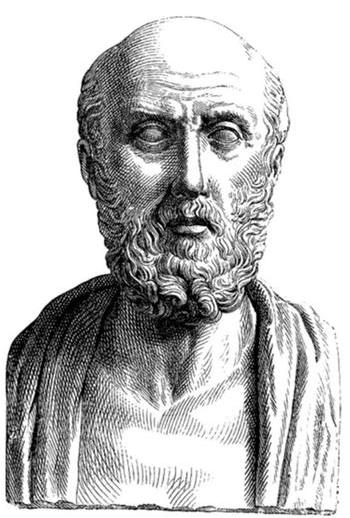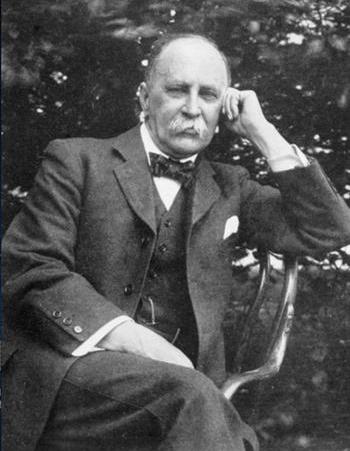Just saying
By Simon Donell
Retired Consultant, Stapley, Somerset
Having spent 36 years working in the NHS, and now retired from clinical practice for over seven years; given it is now 75 years old, I have been thinking back on my time in it. I thought back to how the on-call rooms have changed, the loss of a proper mess, the longer hours but the lighter loads out-of-hours, working as a team truly 'apprenticed' to a consultant, becoming and practising as a consultant. Over the time many memorable sayings enlightened me. That Hippocrates’ (Figure 1) aphorisms are recorded is well known, but not all the apt ones for current practice are. The word comes from the Ancient Greek ἀφορισμός (aphorismós) and can be defined as a “pithy phrase containing a general truth”.

Figure 1: Engraving of bust of Hippocrates Asclepiades (c.460 to c.370 BCE) of Cos, Greece. [Image in public domain]. The Hippocratic corpus, including the aphorisms, was probably written by members of the Hippocratic School.
Another great man for aphorisms was Sir William Osler (Figure 2). An aphorism is a category of saying. Sayings can be categorised as in Table 1.
|
Category |
(Sub-category) |
Meaning |
|
Aphorism |
|
General, observational truth |
|
|
Adage or proverb |
Widely known popular aphorism |
|
|
Apothegm |
Edgy, more cynical aphorism |
|
Axiom |
|
Well-established or universally conceded principle |
|
Cliché |
|
Unoriginal and overused saying |
|
|
Platitude |
Cliché unsuccessfully used as meaningful, effective, or original |
|
Epigram |
|
Clever written saying commenting on a person, idea, or thing |
|
Epitaph |
|
Saying in honour of a deceased person |
|
Epithet |
|
Descriptive word or saying widely associated with a specific person, idea, or thing |
|
Idiom |
|
Saying that only has a non-literal interpretation e.g. “kick the bucket” |
|
Mantra |
|
Religious, mystical, or spiritual saying that is repeated, as in meditation |
|
Maxim |
|
Instructional expression of a general principle or rule of morality (or often used as synonym for aphorism) |
|
Motto |
|
Saying used by person or group to summarise its general mission |
|
|
Credo |
Motto extended to express larger belief system |
|
|
Slogan |
Motto with aim of persuasion |
|
Quip |
|
Clever or humorous saying based on an observation |
|
Witticism |
|
Saying that is clever and usually humorous that is notable for its form and style, more than its meaning |

Figure 2: Photograph of Sir William Olser, Bt FRS FRCP (1849 to 1919) [Wikimedia Commons] Canadian physician and one of the founding professors of the Johns Hopkins Hospital, Baltimore, USA.
Below is a list of sayings that inspired or amused me. Most are ones I have used with patients or staff. It is an eclectic bunch that includes aphorisms. Rather than putting them in the categories above, they have been divided by themes. Hopefully they will make you think.
Retirement
1. The time to retire is when you start taking an interest in the history of your subject. (Keith Tucker)
2. The time to retire is when you have been in practice long enough to see that the treatments you have given have not worked the way you thought they did
Medical practice
3. It is more important to know the patient that has the disease, than the disease the patient has. (Sir William Osler, Figure 2)
4. The greatest medicine of all is teaching people not to need it. (Hippocrates)
5. If someone wishes for good health, one must first ask oneself if they are ready to do away with the reasons for their illness. Only then is it possible to help them. (Hippocrates)
6. In an athlete, extreme training is dangerous, for they cannot remain at peak performance nor be stationary; and since, then, they can neither remain stationary nor improve, it only remains for them to get worse. This is why extreme training should be reduced without delay, so that the body may repair itself. (Hippocrates)
7. Life is short, and Art long; the crisis fleeting; experience perilous, and decision difficult. The physician must not only be prepared to do what is right himself, but also to make the patient, their attendants, and their families and friends to agree with the management. (Hippocrates)
Orthopaedic practice
8. The outcome of an operation depends on the three P’s: the personality of the patient, the personality of the disease, and the personality of the surgeon. (AD Patel)
9. They don’t sue you if the bone is straight. (Tom Wadsworth)
10. The surgeon (surgical team) and the implant contribute only a small amount to the outcome, the majority is due to the patient.
11. The clinical notes are only as good as the consultant’s interest in them.
12. If you accept a badly taken plain radiograph then you will regularly be given badly taken ones. (AD Patel)
13. If you sign your work by leaving a surgical scar on the patient, any problems in the future affecting the patient they will blame on you, even pre-existing symptoms.
14. Initially you are judged by the quality of the bandage or plaster cast, shortly followed by the wound. Patients never know the quality of what has happened under the skin.
15. On the ward round, look each patient in the eye as you shake their hand. This instils trust.
Working in the NHS
16. Change in the NHS occurs when the system fails, not by forward thinking. Therefore clearly define your goal, and take the opportunities to get there as failures arise.
17. Everyone knows what excellence looks like. Do not accept the average. However, only strive for excellence, not for perfection. If you only accept the latter you will fail yourself, the staff, and, most importantly, the patient.
18. The good leader chooses team members who are better than themselves, and then facilitates the team to progress their skills and aims. Invariably the members’ successes are considered to be the leader’s. The bad leader chooses poor team members and is held responsible for their failures, although blaming them.
The old NHS
19. As a consultant in the NHS there are only two operations that I do, those that are interesting and those that are lucrative, all the rest are done by my senior registrar. (David Paton)
Training and trainers
20. The good trainee helps their trainer to achieve their goals when the trainer has helped the trainee to achieve theirs.
21. The bad trainee fails to achieve their goals on time.
The knee
22. The knee is like a car; it only works if the timing is right and the fuel mixture correct.
23. The knee is like a car; you can replace the engine, but it will only work if the timing is right and the fuel mixture correct.
24. With the ageing knee you have a choice, either keep hammering it and then have a new one, or just be nice to it.
25. A knee replacement is about quality of life and what you enjoy. You should enjoy life, but realise the more you use it, the less long it will last.
26. Having a knee replacement is like buying a new car. If you want it to last the longest time, leave it in a garage. However if you load the car up with people and luggage and then travel over mountain roads or at maximum speed, expect to buy a new car.
27. With a bent knee the skin is taut and it is easier to get an accurate wound repair. Unlike sewing the extended knee, the bent knee’s wound does not get ischaemic with flexion, especially with a sealed dressing.
28. You can sew up a knee with it bent or straight. If bent they have difficulty straightening, if straight then bending. Most people, but especially the elderly, prefer to sit in a chair to kicking a football.
Patients
29. The bad habits you had in your twenties, you pay for in your forties.
30. Good skeletal muscle function leads to good heart function. Good heart function means good blood flow to the brain. Good blood flow to the brain reduces the risk of strokes and dementia.
31. A healthy musculoskeletal system requires a proper diet, regular exercise, not smoking, and minimal alcohol or recreational drugs, just like all the other organ systems.
32. Experience teaches that the outcome of your operation does not depend on how well you did it but on how much the patient wanted to get better.
33. In chronic illnesses, especially chronic pain, both the patient and their carers need to understand the problem, agree to the management plan, and carry it out diligently.
34. Never say to a patient “Nothing can be done” since what you really mean is that you do not know what to do. Send them to someone who does.
35. Even when facing death, patients need hope.
